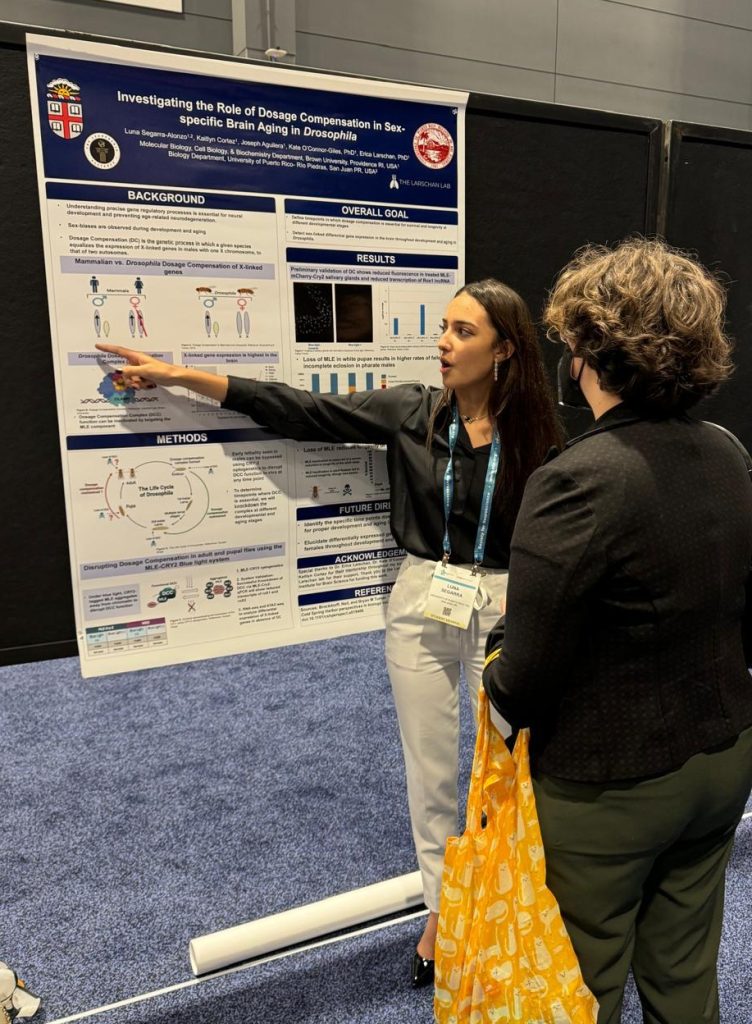
Home Research
Mentor/s:
Imilce Rodríguez-Fernandez, Ph.D.
Project Title:
Potential brain-specific activation of the transcription factor Nrf2 by L. plantarum in Drosophila larvae
Project Description:
I joined Dr. Imilce Rodriguez-Fernandez’s laboratory in my sophomore year to study the Gut Microbiota-Brain axis using Lactiplantibacillus plantarum (L. plantarum), an antioxidant and anti-inflammatory probiotic known to activate Nrf2 (in humans)/CncC (in Drosophila). Our preliminary data shows that feeding L. plantarum to Drosophila activates Nrf2/CncC in the intestine, fat body, and unexpectedly, in parts of the brain. My project aims to characterize this activation of Nrf2/CncC in the brain of Drosophila larvae. After treating the larvae with L. plantarum, I dissect their brains, apply immunohistochemistry to label cell membranes and neurons, then image them with a confocal microscope. Next, I plan to perform functional genomics experiments to determine if this activation contributes to brain development.
Summer Research
Mentor/s:
Erica Larschan , Ph.D. & Kate O’Connor-Giles, Ph.D.
Project Title:
Investigating the Role of Dosage Compensation in Sex-specific Brain Aging in Drosophila
Project Description:
At Brown University, through the Leadership Alliance SR-EIP, I worked with Dr. Erica Larschan and Dr. Kate O’Connor Giles on a summer project investigating dosage compensation in the Drosophila brain across development and aging. We examined how precise gene regulation is essential for neural development and may influence age-related neurodegeneration. In XY species, the Dosage Compensation Complex (DCC) equalizes X-linked gene expression in males by doubling transcription from the single X-chromosome. Our focus was on the DCC component Maleless helicase (MLE)—known as RNA helicase A in humans—using an MLE-CRY2 optogenetics system for targeted knockdown. We hypothesized that while dosage compensation (DC) is vital during development, its influence diminishes with age in males, potentially affecting longevity. Using optogenetics, RNA-seq, and imaging, we assessed differential expression of essential neuronal X-linked genes when DC is disrupted. We inactivated the DCC at various stages and validated the knockdown with qPCR, which showed reduced roX1 RNA transcripts after blue light exposure. Preliminary RNA-seq data revealed that MLE inactivation increased defective eclosion rates and reduced adult male longevity, underscoring DC’s role in both development and sex-specific brain aging. I continue to work remotely on this project, performing RNA-seq analysis and differential chromatin looping analysis using Python.

Summer Research
Mentor/s:
Chaolin Zhang, Ph.D.
Project Title:
RNA Editing by SnRNA-based Optimization of Spliceosome-mediated Trans-splicing
Project Description:
PENDING